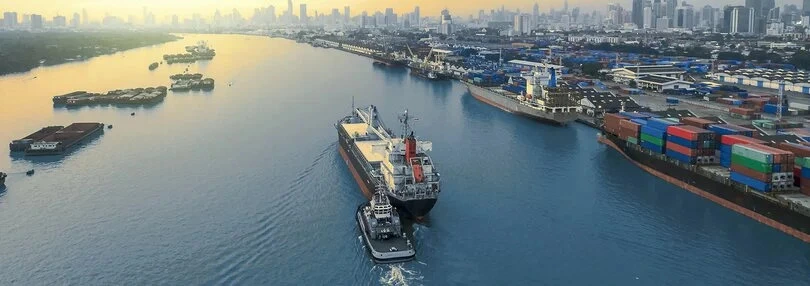Ahoy there, maritime enthusiasts! Are you ready to set sail on a voyage through the intricate world of marine insurance? As you embark on this journey, you may be surrounded by perplexing jargon and industry-specific terminology. But fret not! In this blog, we're here to be your guiding light, helping you navigate the murky waters of marine insurance jargon.
Why Understand Marine Insurance Jargon?
Before we embark on our exploration, let's first understand why it's essential to grasp the language of marine insurance. Picture this: you're a shipping business owner or a cargo owner, and you encounter an unforeseen incident like a vessel grounding, piracy, or damage to your goods during transit. In these critical moments, understanding the jargon becomes crucial. It allows you to communicate effectively with insurers, claim adjusters, and other industry professionals, ensuring you make informed decisions and protect your interests.
The Challenge of Marine Insurance Jargon:
Marine insurance is a complex and highly specialized field with its own unique set of terms and jargon. Navigating these terms can be challenging for international trade and shipping businesses. The extensive use of terms often feels like deciphering a foreign language, making it difficult to comprehend the nuances of policies, coverage, and claims processes.
Our Promise: Simplifying the Complex:
In this blog, we solemnly promise to unravel the mysteries of marine insurance jargon. We're here to bridge the gap between confusing terminology and your understanding, providing plain language explanations and relatable examples. We aim to empower you with the knowledge and confidence to navigate marine insurance complexities easily.
- Average: Average refers to the proportion of a loss that is covered by insurance. It can be either a general average or a particular average. The general average occurs when there is a voluntary sacrifice or expenditure made during a voyage to protect the common interests of the ship, cargo, and crew. The costs incurred are shared proportionally among all parties involved. On the other hand, particular average refers to a loss or damage that happens to an individual ship or cargo. In this case, only the affected party bears the loss.
- Bill of Lading: A bill of lading is a document issued by the carrier that acknowledges the receipt of goods and serves as evidence of the contract of carriage. It acts as a receipt for the cargo, a document of title, and a contract between the shipper and the carrier.
- Excess: Excess, also known as a deductible, is the amount that the insured party must pay before the insurance coverage comes into effect. It represents the portion of the loss that is not covered by the insurance policy.
- FOB (Free on Board): FOB is a trade term indicating that the seller is responsible for the goods until they are loaded onto the ship at the specified port. Once the goods are loaded, the risk and responsibility transfer to the buyer.
- General Average Bond: A general average bond is a legal document that the cargo owner provides to the carrier as a to guarantee for their share of the general average contribution. It ensures that the cargo owner will contribute their proportionate share of any general average expenses.
- Inherent Vice: Inherent vice refers to the natural characteristics or qualities of goods that make them prone to damage or deterioration even under normal circumstances. Marine insurance policies often exclude coverage for losses caused by inherent vice.
- Jettison: Jettison refers to deliberately the deliberate act of throwing goods or equipment overboard from a ship to lighten the load and avoid further damage or sinking. In cases of general average, the value of the jettisoned or scrapped goods is proportionally shared among all parties involved.
- Salvage: Salvage refers to the act of saving or recovering cargo or vessels from peril or loss at sea. Salvage operations are typically carried out by specialized salvors who receive a reward, known as a salvage award, for their services. Discover the crucial role salvage operations play in mitigating losses and how salvage contracts are structured.
- Total Loss: Total loss occurs when the insured property or cargo is completely destroyed, lost, or damaged beyond repair or recovery. In marine insurance, the total loss can be either actual total loss or constructive total loss. Actual total loss refers to a situation is where the goods are physically destroyed or irretrievably lost. Constructive total loss refers to a situation is where the cost of recovering or repairing the goods would exceed exceeds their insured value.
- Utmost Good Faith: Utmost good faith is a fundamental principle in marine insurance. It requires all parties to the insurance contract to disclose all material information accurately and honestly. This principle emphasizes transparency and mutual trust between the insured and the insurer.
- War Risk Insurance: War risk insurance provides coverage for losses or damages resulting from acts of war, such as hostilities, acts of terrorism, and civil unrest. Standard marine insurance policies typically exclude coverage for war risks, so separate war risk insurance is required for vessels and cargoes travelling to high-risk areas.
- York-Antwerp Rules: The York-Antwerp Rules are internationally recognized guidelines that govern the general average in maritime law. These rules provide a framework for allocating the allocation of general average contributions and expenses among the parties involved in a maritime adventure.
- General Average: Unravel the concept of shared losses and contributions in maritime incidents, ensuring you understand how it can impact your cargo.
- Institute Cargo Clauses: Decode the different levels of coverage offered by these clauses and learn how they protect your goods during transit.
- Perils of the Sea: Gain insight into the unpredictable forces of nature that can cause damage to your vessel or cargo, and understand the coverage provided for such perils.
- Freight Forwarder's Liability: Explore the responsibilities and potential liabilities of freight forwarders in handling your cargo and the insurance implications involved.



